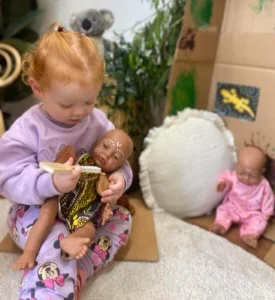Do your children play with dolls? There have been some fascinating research findings that highlight the advantages of dolls as a tool for nurturing social and emotional skills in children. Recent studies have shown that doll play provides children with opportunities to engage in imaginative role-playing, develop empathy, and enhance their communication about others’ thoughts and feelings. There’s also been some research that looks at traditional notions of gender preferences in toy choices, emphasising the importance of providing children with diverse play experiences, all of which we’ll explore here.
Research challenges the notion of innate gender preferences in toy choices. Studies have found that even baby boys can and will show a preference for dolls over trucks, indicating that toy preferences may be influenced by environmental factors rather than biological predispositions. By encouraging children to play with dolls, we can help them develop a broader understanding of the world, challenge gender stereotypes, and promote equality.
Doll play provides opportunities for children to practice social and emotional skills by creating imaginary worlds, taking others’ perspectives, and talking about others’ thoughts and feelings, according to 2020 research titled Exploring the Benefits of Doll Play Through Neuroscience. The study, conducted by researchers from Cardiff University and King’s College London, saw 33 children between the ages of four and eight freely play with Barbie dolls and accessories, or tablet games with a social partner or by themselves.
The children were left to play spontaneously, but their chat was monitored and they were also fitted with a specialised cap containing state-of-the-art, functional near-infrared spectroscopy equipment – a form of brain imaging technology, making it possible to track brain activity while the child freely moved around.
The study found that the children talked more about others’ thoughts and emotions when playing with the dolls, compared with playing creative games on a computer tablet, such as a hairdressing game or a city-building game with characters.
Social play also activated the right prefrontal regions in the brain more than solo play, researchers found. These areas of the brain are responsible for regulating thoughts, actions and emotions.
The children in the study were also more likely to talk to the dolls versus characters in the digital games, which showed they were developing important social and emotional skills, according to the lead researcher.
“When children create imaginary worlds and role play with dolls, they communicate at first out loud and then internalise the message about others’ thoughts, emotions and feelings,” says lead researcher Dr. Sarah Gerson in the university release. “This can have positive long-lasting effects on children, such as driving higher rates of social and emotional processing and building social skills like empathy that can become internalised to build and form lifelong habits.”

Closer to home, research conducted at the University of Western Sydney in 2013 found young baby boys seemed to prefer dolls to trucks, challenging the theory of an innate preference among babies for typical feminine or masculine toys. Researchers gauged the preferences of four and five-month-old babies by showing them pictures of male and female humans and dolls, as well as cars and other items.
Researchers then measured how long their gaze lingered on the objects, and calculated their preferences based on that length of time. Researchers found there was a general looking preference for dolls or doll faces over cars or trucks for both the male and female babies observed at five months old.
Other studies conducted at U of WS have found as babies age, there are sometimes preferences toward toys marketed at their own gender, but those preferences, researchers hypothesised, could be environmental or a result of nurturing, so if they’ve been given more opportunities to play with toy trucks than dolls, they may show a preference for toy trucks.

Babies don’t typically show gender preference until at least their second year, according to some studies, indicating that preference later may be the result of their physiological changes, cognitive development or social pressure.
Playing with dolls is a version of role-playing, and that’s a great thing in child development. Dolls are used to create narratives while playing. When children do this, they’re learning to make sense of the world and this kind of role-play helps them see things more broadly.
Other research has looked at how gendered toys are approached by each sex. One study in the 1980s had a few dozen girls and boys (aged four to nine years) presented with toys in three sex-labeled boxes and were given six minutes to explore the objects. The children’s memory for information about the toys was tested one week later. Results show that the children tactually explored toys labeled for their own sex more than similar objects labeled for the other sex, and remembered more detailed information about own-sex than other-sex objects. Between ages three to five, gender is very important to children, according to an an associate professor at the University of Kentucky. So when children are presented with very specifically-marketed gendered toys, they pay careful attention.
This is a time we should encourage children to play with all kinds of toys, as it sets the foundations for free thinking, creative play and removes the constraints of gender.
The benefits for children, regardless of their sex, of playing with dolls are numerous and supported by research. Doll play provides opportunities for children to practice social and emotional skills, develop empathy, and engage in imaginative play. Studies have shown that doll play leads to increased communication about others’ thoughts and emotions, activating important brain regions responsible for regulating thoughts, actions, and emotions.
At Little Scholars, we recognise the importance of supporting children’s interests and providing them with a diverse range of toys and play opportunities. Our home corner, which includes dolls and role-playing materials, encourages children to explore, imagine, and develop important skills and dispositions for learning. By embracing doll play and role-playing activities, we foster autonomy, creativity, problem-solving abilities, and a sense of agency in our children.
References:
Let us hold your hand and help looking for a child care centre. Leave your details with us and we’ll be in contact to arrange a time for a ‘Campus Tour’ and we will answer any questions you might have!
"*" indicates required fields
Let us hold your hand and help looking for a child care centre. Leave your details with us and we’ll be in contact to arrange a time for a ‘Campus Tour’ and we will answer any questions you might have!
"*" indicates required fields